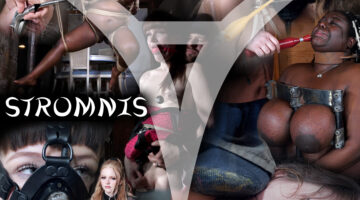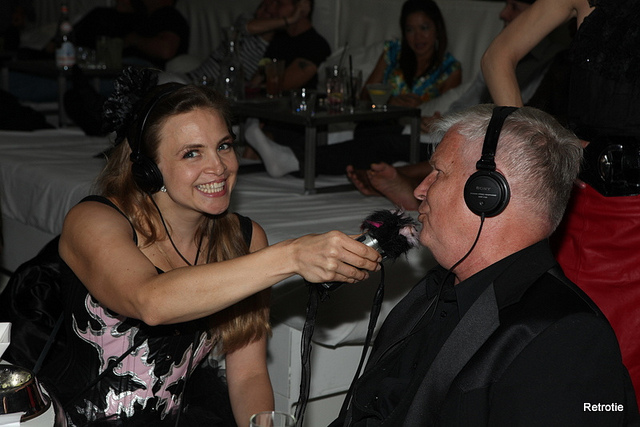Interview With Rick Umbaugh, BDSM Culture Writer
by Sensous Sadie
Rick Umbaugh has been practicing S/m since 1968. He joined the organized scene in 1976 when he became a member of The Eulenspeigle Society (TES) where he was mentored by the late Master Jack. He has been an actor and playwright longer than that, but became a professional in 1972 when he made his first movie. He has appeared in such varied fare as “Taxi Driver,” “Cotton Club,” the new “Thomas Crowne Affair” and the TV show, “Law and Order.” Rick is currently at work on a play called (working title) Playing Seriously which he has read in NYC and will read again for The Society in Connecticut in October. Rick has a degree in Playwriting, and has been happily married for 15 years.
SENSUOUS SADIE: Please tell me a little about your background.
RICK UMBAUGH: “I grew up in the suburbs of Chicago in a town so conservative that they considered the suburb just north of them, where the John Birch society was created, to be too liberal.”
Sadie: How did you discover BDSM? Was it always in you, or something that developed?
Rick: “I discovered S/m when I was very young. I wrote a short story for 6th grade English class that had strong S/m elements. Now, this doesn’t mean that I discovered that I was well and sane in spite of these perverse sexual urges, quite the contrary. The school highly disapproved of my tendencies, my parents tried to help me ‘outgrow’ them and my peers shunned me as obnoxious and gay. Indeed, if I had any gay tendencies I would have been adopted by that community, and been kicked out of school very young. This was the early 60s and a conservative community, after all. I didn’t discover that there were others like me who were perfectly functional human beings until I came to NYC and discovered the Eulingspeigel Society, in 1974 that I really discovered and began to accept my tendencies.
Now, I would like to say that they have been with me all my life, but that isn’t exactly true. The most recent theories about how we arrive at out sexual preferences is that our orientation, gay or straight is a potential within us which has to be brought out by our first sexual experience. A gay man is drawn to gay men, so his first sexual experience will probably be gay and visa versa, which will set his orientation. If his first sexual experience is het then he will head off in that direction. Just how much this moving away from your basic predilections is pathological or harmful is a matter of debate. I personally don’t think it is, but others disagree.
Our other preferences seem to be determined by our first peak sexual experience. Because of the lousy sex education in this country and the tendency to idealize the ignorant gropings of virgins most of us do not have our first peak experience with our first sexual partner. My first peak experience was tying a woman to bed in college, but the idea of doing it was planted in my mind much earlier, by the old sword and sandal epics like ‘Hercules,’ ‘Spartacus,’ and others where the sight of chained and imprisoned women was a big turn on, as well as the sight of the bound hero.”
Sadie: You are a bit of the classic “starving artist,” being a writer and actor. What is your focus in terms of your BDSM writing?
Rick: “It depends on what you writing you are talking about. In my article writing I used to do ‘How-to’ articles, but there are plenty of those out there now so I’m focusing more on the psychological end of it now.
In my playwriting I’ve only got one BDSM play out there, and I’m having a horrible time trying to sell it, because of the subject matter, but my focus is, even in this play, is not BDSM. This play is about the compromises of marriage. I’m getting ready to write a play about M. De Sade and Shakespeare, it will have a lot of BDSM in it, but it is going to be about the position of the artist in the Real World.
Sadie: Your writings about spirituality and BDSM “put you on the map.” What was the response that you received to your writing? How did it affect how much you wrote and what you wrote about?
Rick: “Like many atheists I’m rather obsessed with religion, what it is, why people believe what they do and how to live a credible life without it. What I latched onto was the philosophical forms (Arthur Clark calls them the ‘more austere’) forms of oriental religion, Zen (without the Buddhism) and Taoism (without the shamanist element). I was reading a book, The Tao of Zen which was a history of these two spiritual philosophies and how their attachment to religions has distorted what their originators seem to be saying.
At the same time I was doing research on why so many of the medically insane take on religious mythologies as a backdrop to their diseases and a friend turned me onto Shorto’s book, Saints and Madmen. As I read these books is hit me that what we are seeking for in our BDSM play is not much different from the Taoist experience of blending with the world and the ‘god-drug’ experience that Shorto talks about comparing the experiences of madmen and addicts to those of Christian mystics. The result of this was my article ‘The Art of S/m.'”
Sadie: You have commented that you are a risk-taker, and regularly “make an ass out of yourself.” Can you expand on this?
Rick: “Back when I was in High School I use to get papers back with comments like ‘Wonderful idea, but you made a giant leap of logic.’ My brain can take an idea and connect it up in some surprising ways to people, but when I write or talk about them I don’t always have all the logical dots connected, and what was worse is that sometimes I don’t even see the need for these logical steps, so sometimes I take great leaps, and there is a risk in that, because sometimes the ledge you are leaping to isn’t really there, so you make an ass of yourself.
Frankly, I think the risk is worth it. I promise you, if you had an omniscient view of the history of ideas you would find that for every successful leap, like Einstein’s, you find 10 others who have made asses of themselves.”
Sadie: You have written a play called Freedom In Chains: A Sexual Comedy. The play is about the use of loving dominance, submission and rough sex to save one’s marriage. What is your feeling about whether the vanilla world wants to see BDSM themed art?
Rick: “I think the public would like to see it, if the script were good enough, but producers, at least the one’s I’ve found here in NYC, are too afraid of their public, or too infused with Political Correctness to make the leap of faith necessary to take the risk of producing a play were someone gets an enjoyable flogging at the end.”
Sadie: Can you tell a little more about the play and what motivated you to write about it as you did?
Rick: “It’s the story of Rosie O’Hanlan and her husband, John. He is very straight, very vanilla, she is kinky and the play is about how they resolve this conflict and save their marriage. I came on the idea as I watched a friend of my lose her marriage over the same issues.”
Sadie: Do you find that your BDSM background affects your acting in any ways? If so, how?
Rick: “It’s actually the other way around, my acting affects my BDSM. This always gets me in a lot of trouble but I consider Dominance a performance art. It’s about bringing a fantasy to life, whether it is yours or the submissive’s. Acting is the same thing, only the audience is bigger and the pay is better, at least up to now.”
Sadie: In our community there is a strong focus on the technique side of things. You focus more on context. Can you tell me a little bit about what you mean by this.
Rick: “Vanilla relationships live within the ‘real world.’ It’s about Dick and Jane using their sexual tools to pleasure one another and that’s it. It may involve all kinds of things which stimulate them, but it is always about the people involved and the context is always the ‘real world’ and the two people involved in a sexual act. If all we do is add BDSM techniques to this same context then the sex act may be more exciting, but it isn’t using BDSM to it’s fullest power.
BDSM is play which can take us out of our mundane, real worlds and put us anywhere we want. This role-play frees the mind and allows us to create a space in our sexual lives where we can be whomever we choose, doing whatever we like. There is a scene in ‘Unfaithful,’ Adrienne Lymes’ new movie, where Richard Gere and Diane Lane are attempting to get something going and their kid interrupts. Once this happens they lose the mood and it is this sexual frustration that drives her into the arms of another man. Now, if they had been playing some kind of scenario or doing BDSM they would have had a context which would have given them a way back into their sexuality. Beyond this, I feel that getting our sex lives out of the ‘real world’ makes them more intense, more dangerous, a thing which vanilla sex can never give us.”
Sadie: You are a fencer. I have certainly seen other fencers use those techniques and stances while flogging. How have you used your skills in fencing in your BDSM play?
Rick: “Pretty much the same way. I suspect that the eastern martial arts are more applicable to flogging, but there are ways to use a sword in play, it’s just a very long knife.”
Sadie: You have an interest in Zen as well as Taoism. What are some of the ways that you integrate these interests into your BDSM play? How do you utilize the “walking meditation” of Taoism?
Rick: “To me, Zen and Taoism are essentially the same thing, a philosophy of life. The are about finding the God in oneself, which, of course, means understanding our essential humanity. On the occasions when I bottom this practice helps me into subspace. When I Top it helps me in my focus on the bottom. This ‘walking around Zen’ or ‘walking meditation’ is what helps me to focus in on my bottom as moment-to-moment-ness brings one closer and closer to the person you are working on.”
Sadie: You write “the act of submission shows us where we want to go but the goal is to reach that state no matter what we are doing. I often get there when I dominate someone and even more so when I write.” Can you explain what you mean? Are you saying the subspace is the same as your writing muse space? If so, how?
Rick: “It is Domspace I was talking about primarily. Domination, Topping, is a creative act. It requires the same mind muscles, particularly when one is trying to keep a long term relationship going, as my writing. My writing is more intense because I don’t have to keep a toe in the ‘real world’ to make sure that I don’t damage my partner. What I was talking about there was that the effects, the feelings of all these actions are the same. What has always amazed me is that I feel the same after Domming as I do after writing, as I do after bottoming. It is simply a matter of intensity. The writing, as I said is the most intense, followed by the bottoming, which is essentially passive and lastly the Domming. Domming has other, more earthy rewards which make up for the intensity.
Sadie: You practice some tantric sex techniques. Can you tell me a little bit about which techniques in particular interest you? How have they affected your BDSM practice?
Rick: “I have an orgasm fetish. I love making a woman come and come and come until she feels she can’t come any more then giving her another one. To me, that is the ultimate form of Domination. In order to do this I have to control my physical and mental climaxes, so I don’t lose control myself until I have gotten her out of control. I use some Tantric techniques to do this. Fortunately, as I get older it gets easier to control myself.”
Sadie: What are some of the spiritual/BDSM experiences that moved you the most?
Rick: “The first time I have a woman coming so hard that she thought she was going to go crazy from sexual excitement. The look in her eyes, the smell of her fear that was heaven and I was god. She told me later that it was everything about me that had turned her on so much but that when she looked up at me she saw ‘the devil.’ What the Hell, ‘better to rule in hell than serve in heaven.'”
Sadie: What is your religious background? In what ways did it affect your approach to BDSM?
Rick: “I lost my western religious roots very young. I was raised in a traditional Lutheran Church. Christianity has always seemed pretty bland to me, it lives only in one’s head, which means that it doesn’t have much to do with BDSM, at least for me.”
Sadie: How did your experiences with the spirit realm change your BDSM practice? Did they change your life as well?
Rick: “I believe that the spirit realm exists only inside of us. I’ve done things like lucid dreaming, but I’m convinced that these things come from within us and only exist within our minds, our brain functions. This doesn’t make them any less real or meaningful, just not objectively real.
As to how they effect my BDSM, I would say that they are in many ways the wellspring for my Dominance, which comes from a very deep need to make and see people happy. I know this sounds funny coming from someone who openly confesses to being a Sadist, but the interesting thing is that the man who gave his name to the practice, the Marquis De Sade may have had the same reason. He wanted very much to be a playwright and the French Bocaccio (sp? can’t find my copy). He was first and foremost an entertainer and one can see this in what little we know of his sex life (mostly from lawsuits). What is interesting is that if he had lived in our time he probably would have fit in right with the scene, maybe a little arrogant, he was, after all, a French aristocrat, but not as much as some of the Doms I’ve met, and considerably less so than some of other Doms.”
Sadie: You write that “as a top and as an artist, my natural inclination is to be both inside and outside of things I do at the same time.” What do you mean by this?
Rick: “He takes his or other people’s fantasies and, using his creativity, brings them to fruition. What better definition of an artist?”
Sadie: You write: “in the not to distant past this responsibility was expressed in the Code Duello, in which a gentleman was held responsible for not only the honor of his behavior but also for the behavior of his household. This responsibility is the source from which all dominants, from the old guard to today, receive their right to dominate. Until a dominant understands this basic principle he or she is, to my mind, not worthy of the submission of anyone. This is a very dogmatic stand, I understand, but one need not spend a lot of time in the scene to see how important this concept is.” I’m sure you are aware that the idea that any of us need to “receive a right to dominate” is highly debatable. How do you respond to contemporary BDSM players who feel that their right to dominate is predicated only on their personal choice to do so?
Rick: “The have a right to their beliefs, but it makes me nostalgic for the days of leather bars and motorcycle clubs when if one wanted to become a Dom one had to learn the practical and psychological skills first. I suppose that one can simply declare him or herself a Dom and take on the role, but if you haven’t learned the skills needed you aren’t going to have partners. More importantly, you have to learn to keep things interesting, that means you have to consistently learn new things, as the relationship progresses and the inevitable boredom with each other sets in. Someone who feels that they are entitled, instead of earning the right, generally doesn’t want to put in the work to become more than his or her own fantasy. They are entitled to define themselves, so their Dominance is natural. To me, that is not more than one step from the vanilla fallacy about sexuality, ‘I’ve got a cock, you’ve got a pussy, what could be so hard about that?'”
Sadie: You have written about the challenges of working with contemporary women in that she “has been taught to break the molds of the old society, which set up an antique model of womanhood, and, finding that she wants, however temporarily, to be placed back in that mold, is something of a shock.” How do you address this apparent contradiction?
Rick: “This may be a function of my age. I fought the gender wars and not very successfully, so what I am taking about here is the contradiction between a woman who wants to be a feminist but still wants to submit. Submission is a matter of losing control, of giving up to the top all vestiges of one’s ego, one’s soul. Modern women, in my experience, are taught not to do this. What is interesting is that the submissive women generally are people who, in their business life, are in control, powerful. When they talk about this contradiction it sounds very much like the things I have heard from submissive men over the years.
Sadie: You write about the “paradox of the top.” Can you explain this for our readers?
The paradox lies with in the realm of play. First, the Top is the one doing all the work, second, he or she can only do to the bottom what the bottom has agreed to. These statements are overgeneralizations, but they are very much what the power exchange is about. The paradox lies in the fact that while the Top seems to be the one in charge, it is the bottom who gets the rush of subspace, while the Top has to keep a foot in the real world to make sure that things stay safe.
This is the same paradox which lives in Michaelangelo’s statement that he is not the sculptor, but the person who frees the statue from the stone. I take my pleasure from the places that I can take the people who bottom for me, from the way in which I can mold and shape them under my ministrations. It is the joy of a sexual artist.”
Sadie: You have commented that “I’m a big tough dom after all, I should be able to take what I dish out” regarding switching. How has your experience of switching added to your overall style as a dominant?
Rick: “By learning to Dom by apprenticing, which required a certain amount of submission, I have learned better how to read my submissives. I’ve told people that they should be so good at this that no one should ever have to call a safeword, because they should see their partner falling out of the scene quickly enough that the bottom never has to use the safeword. One new Dom accused me once of saying that the Dom had to be psychic, but it is a simply matter of reading he sub’s body and their reactions to what is going on. This is a matter of experience, on both sides of the whip.”
Sadie: From what I read it sounds like you are a bisexual switch. Would that be a correct label? Any other labels you’d like to share with us?
Rick: “I hate all labels as they put fences around our behavior. I don’t bottom enough to be called a switch but I do switch occasionally, as I consider it healthy for a Dom to do such. I play with men but I don’t get sexually turned on by men, so I don’t consider myself bisexual. I have always been considered a Dom and think of myself as having been in the scene for 30 years plus, but yet I spent the first 10 years of my marriage in a vanilla relationship, with some kink.”
Sadie: You have been married and monogamous for 17 years. However you do write about playing with other people, both women and men. What are the boundaries that you and your wife set up for your presumably open relationship so that you would be able to both have a monogamous love relationship as well as the freedom to explore BDSM with other people?
Rick: “I will tie you up, whip you, cane you, wax you and do a lot of things, but I won’t kiss you, play with your genitals (nipples are neutral territory) or do anything else that would smell of vanilla sex, that is what I do with my wife. We most certainly do not have an open relationship. Play is not sex, although with my wife it is sexual.”
Sadie: Considering the fact that so much of our community engages in serial monogamous and sometimes open relationships, what are the factors that have helped you stay married for so long?
Rick: “Loyalty and empathy. I always go home with her. If I am away I never take anyone to my bed. I always take her feelings into account, even if I have to deny myself because my relationship is more important that any temporary fun. If that ever changes then we will break up but marriage is like an octopus, changing colors as the landscape of the relationship changes. As long as the people in the relationship understands that it will stay together, the moment one partner seeks to freeze the relationship where it is then the marriage will die.”
Sadie: When were you first aware of having a higher power in your life?
Rick: I discovered Zen and the Dao rather young in life, at least for the time in which I was young. In high school, when asked what I wanted to be I told people I wanted to be perfect. This of course outraged all the good Christians, but that is what good Christians are for, after all is said and done. Later, after the insane work of my college years I had some down time, Nixon’s second recession, and I got very seriously into Yoga and Daoist meditation and one day I was simply sitting, doing nothing when I suddenly felt very connected to the world and everything around me. I saw the great cogs of Nature as they ground and moved slowly, inextolably, so slow I couldn’t see the movement but I was still aware of it. Now, when religious mystics get that feeling they see ‘the face of God,’ however they believe that face looks, all I saw was the mechanisms of nature, which I suppose, is my ‘higher power.'”
Sadie: Was this related to or independent from your religious upbringing (or lack of it)? In what ways?
Rick: “I was raised a Lutheran and I certainly didn’t see Fr Luther’s God.”
Sadie: When did you first start exploring the connection between BDSM & spirituality? Was there a particular experience or moment that set you on this path?
Rick: “The Dao doesn’t separate one’s life and one’s spirituality, so no connection makes sense within that philosophy. Like the fool I am I never really put the two together until I was fortunate to read The Tao of Zen then Saint and Madmen and wrote my article ‘The Art of S/m.’ Until that I always thought that my Dominance was the wild animal part of me while my Daoism was the civilized, tame part of me, very silly me.”
Sadie: How would you describe the spiritual/BDSM space that you go into?
Rick:
Come! Let us go see
the real flowers …
of this painful world. — Basho
Sadie: What spiritual or BDSM practices help take you there? For example: yoga, meditation, Kundalini, tantra etc.
Rick: “I try to be there with every step, every motion, every word and every stroke of the flail.”
Sadie: How have these experiences affected your life?
Rick: “I have had a great deal coming to terms with my Dominance. It make no sense given my ideas about the inherent sameness of human kind. It is the Zen sense of I am what I do that got me to come to terms with it. By understanding the Ends are the Means I’ve realized how to balance the yin of equality with the yang of Dominance.”
Sadie: How has your spiritual practice informed your BDSM practice? And vice versa?
Rick: “It helps me connect with my victims. It helps me be both them and me.”
Sadie: How do you identify partners who have a similar orientation?
Rick: “Are they humans who enjoy the adventure of BDSM?”
Sadie: Do you also consider your writing to be a spiritual expression?
Rick: “Yes.”
Sadie: Anything else you’d like to add?
Rick: “I read somewhere that Japanese bondage began with Zen monks. If this is true (and who’s to say it isn’t) then one must suppose that it began for the practical purpose of controlling unruly children, as with its extremes of meditation and zazen. It is a gift of beauty.”
Sadie: Thank you very much!
Rick: “You’re welcome.”



















